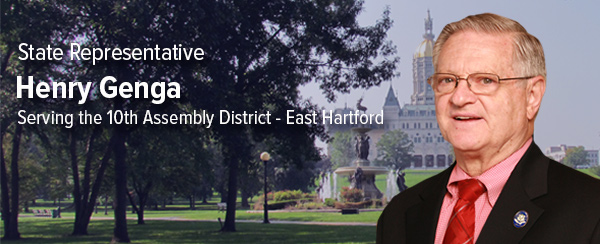
April 20, 2013
By State Rep. Henry Genga
When it comes to democracy, no one does it better than Connecticut. Let's keep it that way.
Over the last few years, some states have proposed laws that restrict the rights of voters. But our state has always been a leader in ensuring a representative, inclusive and participatory democracy that makes sure all voices are heard. That's something we should all be proud of.
Recently, we've passed new rules to allow voters to register on Election Day – critical if you've just moved into town – and another law allowing voter registration online. It's about making sure everyone can participate. We've also enacted the Citizen’s Election Program, which allows candidates to run for office without currying favor with well-funded special interests. That means spending more time talking to my neighbors and my constituents, hearing their concerns and spending less time raising money from big donors.
But one bill making its way through the Connecticut legislature would be a real blow to our democracy. I was disappointed to see the bill, SB 1146, which would ban electoral cross-endorsement, was recently approved by the Government Affairs and Elections Committee.
Cross-endorsement simply means allowing two parties – usually a major and a minor party – to endorse the same candidate. It provides more choices for voters, provides more information to voters on the ballot and improves turnout.
It's a system familiar to Connecticut voters. Most voters have voted on a minor party ballot line at least once. In 2012, over 80,000 Connecticut voters voted on a minor party ballot line for a cross-endorsed candidate. It simply makes no sense to limit the rights of those voters.
Without cross-endorsement, minor parties can easily be consigned to the role of the 'spoiler' – forced to ask their own supporters to cast votes that is at best, just symbolic, and at worst, may perversely help elect the candidate they support least. Ralph Nader's 2000 presidential campaign is one example. Before that, fiscal conservative Perot voters who may have preferred Bush nevertheless helped elect Clinton.
I'm a Democrat. But I've been cross-endorsed in five elections. In past elections, I've been cross-endorsed by one of Connecticut's minor parties, the Working Families Party. I seek their support because I believe I share their values: a commitment to decent jobs, good schools and fair taxes. I was proud to support the Working Families Party signature issue, paid sick days, passed into law in Connecticut in 2011. The WFP supports me because through my voting record, I've proven that I care about the same issues that they do.
But this isn't a partisan issue. In Connecticut history, there have been minor parties that have used cross-endorsement in support of Democrats and Republicans, and for moderates, conservatives and liberals.
For voters, cross-endorsement can provide voters with more information. When you see a candidate cross-endorsed by a minor party, you know a little bit more about where that candidate stands.
Those who are advocating for the cross-endorsement ban claim voters are confused by the system. But it's been the law in Connecticut for decades. And as a candidate who's often been cross-endorsed, I've never had a voter confused about how to vote for me. This attitude shows remarkably little confidence in our citizens.
Minor parties in Connecticut, like the Working Families Party and the Independent Party (and also, going back a few years more, A Connecticut Party) sometimes cross-endorse major party candidates, and sometimes back their own members. And they also have elected their own members to local office. But just because you disagree with a minor party shouldn't give you permission to restrict its political voice. That's not how democracy should work.
The proposed cross-endorsements ban brings to mind the adage, “if it ain't broke, don't fix it.” Connecticut should be proud of its position as a national leader in open and fair elections. We should continue to pass laws that will make it easier for people to vote, and make it easier for voters to have their voices heard. Banning cross-endorsements would be a step in the opposite direction, and that would be a true shame.
In conclusion, I strongly believe this bill would remove an important choice in our democracy.